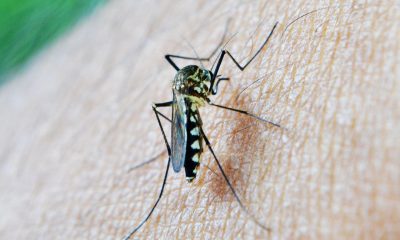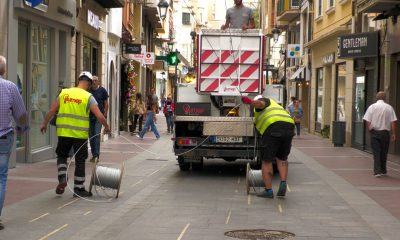Costa Blanca
20,000€ for bullied child in Catral

The Ministry of Education was ordered by the High Court of Justice of the Valencian Community (TSJCV) to compensate the family of a youngster who acknowledged being bullied at the Catral Secondary School from 2020 to 2021 with €20,000.
According to the resolution, when the family of the student, who was 14 at the time, reported the school violence, the school denied that it was happening and even deemed the victim’s absences from class to be unwarranted, indicating that the management team of the school failed to implement procedures to address the incident.
Additionally, he used the COVID pandemic as an excuse for suspending the three students who had confessed to bullying when he eventually activated them to impose sanctions.
Only when psychological studies verified the effect the incidents had on the victim’s mental health did the educational authorities cease their inaction.
Threats, shoving, and insults through WhatsApp
According to the Administrative Litigation Chamber’s Section 4 order, the child has been the victim of “constant” bullying by three Catral Secondary School classmates since the start of the 2019–2020 academic year. They frequently spat slurs at the youngster, including “Chinese, Asian, fat, pig…” and instances where they assaulted her, stole her school supplies and concealed them, or chalk-stained her clothes. They once dumped her rucksack, which contained all of her books, into a puddle of water. She was frequently abused on social media and threatened via WhatsApp after school.
A pattern of harassment
When the student’s family, led by lawyer Pablo Pérez Sola, discovered their daughter was being tormented in December 2019, just before the Christmas holidays, they reported the incident right away to the school, which promised to talk to the perpetrators.
Because they “did not observe a pattern of bullying behaviour towards the student,” the school’s management team insisted that no protocol be created for this circumstance, keeping the bullies in the victim’s classroom for the rest of that school year. According to the instructors, “no cases of bullying were observed when the parties were questioned, and due to the fact that once mediation was conducted, the situation ceased to exist—in their assessment.”
Students who were impacted were warned that “any sign, however small, of animosity would be severely punished and would involve the opening of a case to prevent situations of school violence and the corresponding sanctions.” The school’s administration and teaching staff also promised that “an intensive observation process was carried out by the guidance department.”
Report
The Ministry of Health’s Child and Adolescent Mental Health Unit (USMIA) confirmed in a report that the affected individual had “anxiety-type symptoms secondary to bullying from the previous year” in October 2020, when the school year had begun with restrictions because of the pandemic. In response, the IES committed to creating a program for the minor’s gradual reintegration into the centre, where it had already acknowledged the bullying that it had denied.
The reintegration program was used to justify the student’s absences, as they had not been consistently attended since the start of the school year. But “after a period of time,” the IES concluded that they were unjustified, citing the Education Inspectorate’s and Social Services’ directives as justification.
In-home educational support
The minor’s parents sent the school with additional paperwork in September 2021, including a second USMIA assessment that suggested the student get home-based educational treatment. The procedure for requesting this kind of help started, and the Generalitat (Catalan Government) finally approved the request.
The court’s decision to support the appellant family is actually based on this ruling: the centre thought that the protocols weren’t necessary to start, but nearly two academic years later, it activated this home care measure, thus it feels that the earlier protocols were required.
Psychiatric report
A 2022 psychiatric report that is part of the case file states that the youngster has mental diseases that are consistent with the diagnoses of “post-traumatic stress disorder” and “conversion disorder,” which have “a direct and causal relationship between the expert diagnoses and the bullying.”
According to the same report, “it would be highly advisable to proceed with intensive psychiatric and psychological treatment, for a period of time that, at this time, we cannot specify.” These psychological injuries are described as having “an irregular and persistent evolution that has barely improved with the prescribed treatments” and “producing a notable alteration in his capacity to lead an independent life.”
Appreciation
The Ministry of Education claims that because the lockdown brought on by the COVID outbreak began, the disciplinary actions and reprimands against the participants were halted, “so they were never filed.” Given that the family’s appeal had been submitted to the Legal Advisory Council prior to the proceedings reaching the TSJCV (High Court of Justice), the Ministry of Education itself accepted this.
This process included the Generalitat taking responsibility for 5,000 euros in 2023 for not pursuing disciplinary action against juveniles who “had admitted responsibility for certain acts.”
Abandonment
The decision is “a public denunciation” of the negligence that “the administration often displays in these cases” when bullying takes place in educational institutions, according to attorney Pablo Pérez of the Pardo y Pérez Abogados company. In the absence of a response from the administration, which dismissed the case due to the statute of limitations, the family filed a criminal complaint with the Juvenile Prosecutor’s Office, seeking €56,000 in compensation in its appeal.
Discover more from Costa Blanca Daily
Subscribe to get the latest posts sent to your email.
Costa Blanca
Alicante electrician arrested for faking another blackout to defraud his neighbours

A 33-year-old electrician has been apprehended in Alicante on suspicion of attempting to defraud his neighbours by feigning a new power interruption. He falsely claimed he was addressing a recent power disruption and demanded €50 from each of his neighbours.
The incident occurred in the La Florida neighbourhood around 7:30 p.m. on April 29th, according to sources involved in the case. This instance occurred just 24 hours after the large-scale outage that impacted Spain and Portugal. The man, who had a criminal record, allegedly caused the neighbours’ power to go out by tampering with the building’s electrical panels that afternoon. He then restored the power and demanded money from his neighbours, alleging that the fuse had blown and that he had replaced it to restore the power.
Some of the defendant’s neighbours did pay the €50 he was requesting; however, one neighbour became suspicious and contacted the utility company, which warned him of a potential scam. In addition, a neighbour went down to the electrical panel and observed the neighbour tampering with the meter. The woman and her son confronted the electrician. The electrician broke a glass door in the entrance hall with his bare hands, and the neighbour’s son went upstairs as the argument escalated.
It appears that the electrician pursued him with the intention of extorting 50 euros for the purported work he had performed. Attempting to persuade her to open the door and receive payment, he proceeded to the second floor to call on the door where he believed he resided. However, he proceeded to the incorrect door and knocked on the door of a woman who resides with her 16-year-old Yorkshire terrier.
The electrician repeatedly banged on the door, shouting harsh insults and threats, including “I’m going to kill you,” according to witnesses. The elderly woman refused to open the door until the National Police arrived. The woman’s dog was so distressed by the circumstance that it jumped onto the terrace and died instantly.
The individual who allegedly assaulted this neighbour’s door, resulting in material damage, has a criminal record and was apprehended for alleged threats prior to appearing in court.
Discover more from Costa Blanca Daily
Subscribe to get the latest posts sent to your email.
Costa Blanca
Vega Baja will have the first open seismic network in the province of Alicante

The installation of the province’s first open seismic network will position in the Vega Baja at the vanguard of seismic research in Alicante. The real-time detection of both perceptible and less intense earthquakes will be facilitated by this project, which is being led by researchers Nahúm Méndez Chazarra (UV/UA) and Carlos García-Saura (UAM) and is being promoted by the Mastral Project. This will substantially enhance the understanding of seismic activity in the region.
The initiative was recently introduced at the European Geosciences Union Congress, which was held in Vienna. This event is one of the most significant scientific events in the field of Earth sciences on a global scale. This inventive development, which originated in the region, was the subject of study for over 20,000 researchers.
As evidenced by the catastrophic Torrevieja earthquake of 1829, the Vega Baja is one of the regions with the highest seismic risk on the Iberian Peninsula. The objective of this network is to enhance the accumulation of seismic data, as well as to cultivate a culture of prevention against potential earthquakes and increase public awareness.
The Mastral Project will facilitate the installation of seismometers and the dissemination of the collected data by providing logistical support through the use of its meteorological stations. This will contribute to a more accurate and accessible monitoring of seismic activity in the region.
Discover more from Costa Blanca Daily
Subscribe to get the latest posts sent to your email.
Costa Blanca
Torrevieja puts out to tender urban transport service after 13 years without a contract

Yesterday, Tuesday May 6th, the Torrevieja government authorised the tender for a new urban transport service contract, which is a 10-year concession for a total of €115,440,005 (plus VAT). Since 2012, the service has been rendered without a contract, and audit reports have been virtually automatic as a result of administrative irregularities in the payment of invoices, which amount to approximately €260,000 per month.
In fact, it has been a commitment of Eduardo Dolón’s since he regained the mayoralty in 2019, but it has not been implemented in six years. These contracts, in addition to two other significant contracts, are currently in progress, including waste collection and street cleansing, as well as park and garden maintenance.
The mayor stated that “a significant stride has been taken in the finals of the major services that remained to be awarded.” This project will entail the modernisation of a service that was previously provided under conditions that did not meet our expectations. We are now proposing a modernised service that will significantly increase the parameters of frequency, punctuality, quality, and user comfort, as well as the digitalisation of the service. Additionally, we are committed to reducing emissions and demonstrating our dedication to the environment.
The deadline for proposals is mid-June, and the bid evaluation period will commence in July, unless appeals are submitted. The bid submission period will be 40 calendar days from the tender announcement. As a result, the mayor expects to award the service this year and start providing it by the end of the year.
Increased fleet and workforce
Antonio Vidal, the Councillor for Transport, clarified that the new service results in an increase in the number of employees. Specifically, the government’s dedication to sustainable mobility through low-emission vehicles, with reduced fossil fuel consumption and a substantial reduction in pollution levels, is evidenced by the fact that the number of buses has doubled, from 16 to 32 units (26 hybrids and 6 electric). A driver assistance system will be installed on all buses to enable the concessionaire and users to access real-time information about incidents, service schedules, and routes.
The number of employees has more than doubled, with an estimated workforce of over one hundred professionals, rather than the current 41.
Three nocturnal lines and nine daytime lines
The total number of lines has been increased to nine, with the addition of six new lines: the circular line, the hospital line, the Torreblanca-La Mata-Quirón Hospital line, and three night lines. These lines will provide coverage for high schools, health centres, weekly markets, and cemeteries in both Torrevieja and La Mata, as well as the northern and residential areas.
In addition, the hours will be extended to 7 a.m. to 10:30 p.m. during the low season and 7 a.m. to midnight during the peak season. Night services will be available on Saturdays during the low season, Fridays and Saturdays during the mid-season (June and September), and daily during the peak season.
Fees
Until recently, the standard ticket was free for registered residents who requested it, but it now costs €1.50. The incorporation of the CPI has resulted in a 10% increase in comparison to the City Council’s initial fare calculations for 2021. This is a noteworthy point.
Various ticket categories will be available. The Gold Pass provides unlimited free travel on urban transport throughout the year for individuals over the age of 65, pensioners, or those with a disability that exceeds 33%. In both cases, the prerequisite is that the individual has been a registered resident of the city for a significant period of time.
The special multi-trip bus pass is available at nearly 50% discount for young individuals under 26, large families, and the long-term unemployed (more than two years).
The 30-pass is a fare that is applicable for all users and provides unlimited rides on all lines of urban transport for a period of 30 days. It is priced at 44 euros.
The tourist card is a fare that entitles tourists and travellers to unlimited use of urban transport lines for the specified duration: three days for a fee of 10 euros, and seven days for a fee of 18 euros.
The multi-trip bus pass is a reloadable card that is priced at 11 euros for 10 journeys or 22 euros for 20.
All passes include free transfers for a 60-minute period.
To achieve this objective, the City Council will allocate 8 million euros annually.
The councillor declared, “A fare system that is fair, affordable, and tailored to the service to be rendered.”
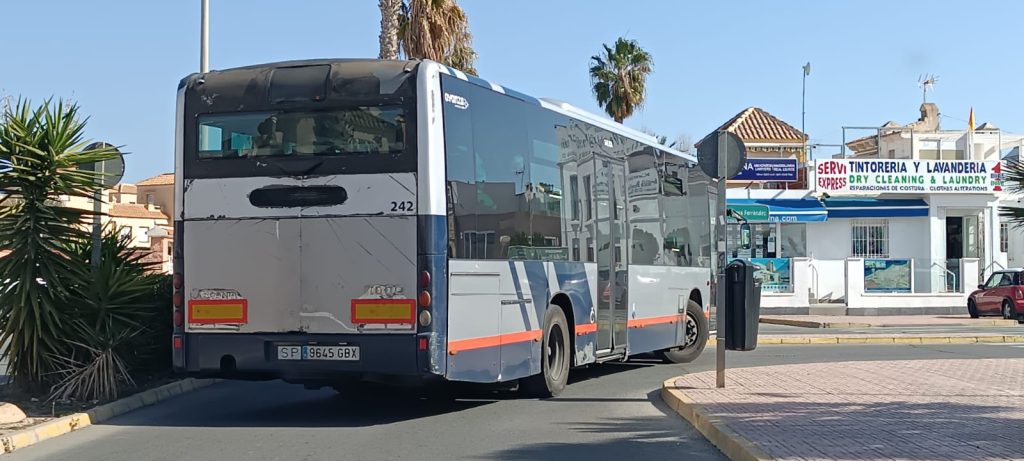
The successful bidder is required to supply 26 hybrid buses and six electric buses. The successful bidder is obligated to provide all 32 vehicles within a 12-month timeframe, with the initial deliveries occurring four months after the contract enters into force.
The City Council has previously awarded these vehicles through a tender process. The successful bidder is required to deposit €19,820,532 upon the signing of the contract in order for the City Council to proceed with the payment of the vehicle purchase price. This is one of the new features included in this document. In this manner, the City Council can ensure that the vehicles are supplied and the service is initiated simultaneously.
They plan to construct, improve, and maintain each of the 180 urban transport service locations. We will also enhance the shelters at these stops and construct new ones.
Similarly, the service will be digitalised, with an operations support system that will optimise routes, identify potential issues, and provide real-time information to users via a mobile app and at locations.
Furthermore, three offices will be open to offer information and services to all consumers. They will be situated in the town centre, the La Mata district, and the primary offices of the contracting company. The hours of operation will be from 10 a.m. to 2 p.m. and from 4 p.m. to 8 p.m., Monday through Saturday.
The new contract encompasses the draughtsmanship of the project and the completion of the requisite works to establish an operational base (€3.1 million) for depots, workshops, and control centre offices, as well as the charging station for 12 electric buses (€963,243).
It will be situated on a 7,550-square-metre site at the intersection of Rosa Mazón Valero Avenue and Juan Valera Street in Enclave 13, specifically on a municipal allotment. After the concession period concludes, the City Council will assume ownership of the entire vehicle fleet and associated digital equipment.
Discover more from Costa Blanca Daily
Subscribe to get the latest posts sent to your email.
-
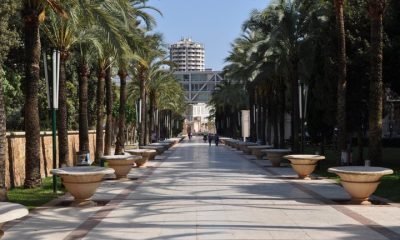
 Costa Blanca2 weeks ago
Costa Blanca2 weeks agoBenidorm studies the temperature of its streets to understand “heat island effect”
-
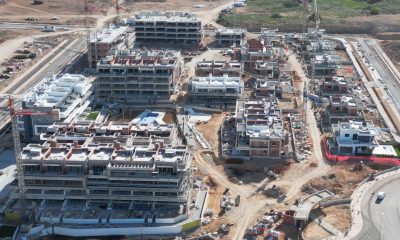
 Costa Blanca2 weeks ago
Costa Blanca2 weeks ago44% of homes in Alicante province were purchased by foreigners
-

 News2 weeks ago
News2 weeks agoThe Generalitat presents the road map for the widening of the CV-95 between Orihuela and Torrevieja
-

 Costa Blanca2 weeks ago
Costa Blanca2 weeks agoCouple arrested for a marijuana plantation with 481 plants hidden in their home
-

 Costa Blanca2 weeks ago
Costa Blanca2 weeks ago‘Cartagena’, the new electric Navy ship
-

 Costa Blanca2 weeks ago
Costa Blanca2 weeks agoFour minors arrested for smuggling drugs on a school trip
-
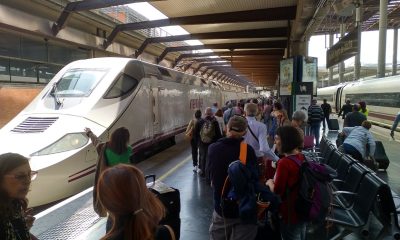
 Costa Blanca2 weeks ago
Costa Blanca2 weeks agoCompetition on Spain’s railways is driving down prices
-

 Costa Blanca2 weeks ago
Costa Blanca2 weeks agoAlicante port gets an electric boat for cleaning the water surface







